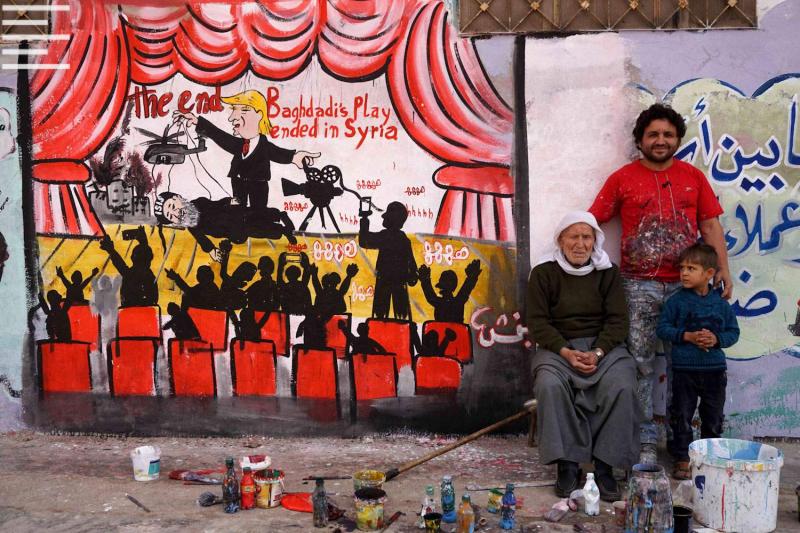It really wasn’t Trump’s bin Laden moment

Theatrics. Syrian artist Aziz al-Asmar (C) poses with relatives near a mural, in the town of Binnish in Idlib province, depicting US president Donald Trump directing the “play” of killing ISIS leader Abu Bakr al-Baghdadi in Syria, October 28. (AFP)
Dana Shell Smith, deputy assistant secretary of state for international media engagement at the time of bin Laden’s death, expressed concern about Trump’s celebratory tone.
Donald Trump’s October 27 announcement that US forces had killed Islamic State leader Abu Bakr al-Baghdadi reprised Barack Obama’s May 2, 2011, statement that Osama bin Laden was dead but in the manner of a tasteless spoof by a third-rate actor.
Trump was abusive, boastful and crass, ticking through the ABCs of how not to deliver the solemn news about the death of a human being, even one such as Baghdadi, who led a barbaric and murderous extremist group.
Baghdadi, Trump told the world with barely concealed glee, “died like a dog… whimpering, screaming and crying… He died like a coward.” Trump dwelt in great detail on the dogs chasing Baghdadi down the dead-end tunnel where he killed himself.
Trump said the US operation that got Baghdadi was “like watching a movie” and that the White House was considering giving the public a chance to watch part of that blockbuster. “We may take certain parts of it and release it,” Trump stated on October 28.
There could have been no greater contrast to the United States’ bin Laden moment from eight years ago and no greater measure of the coarsened sensibilities of its current leaders.
Obama’s sombre announcement of the death of al-Qaeda’s leader and mastermind of 9/11 lasted 9 minutes. Trump’s statement ran 10 minutes, after which a further 40 minutes of Q&A allowed the president to provide graphic detail about Baghdadi’s body parts, praise his own books and boast inaccurately that he had been the first to warn of the threat posed by bin Laden.
Obama spelt out the context of the hunt for bin Laden — the attack on American soil, al-Qaeda’s threat to US allies and its attacks on Muslims. Trump focused on what he called Baghdadi’s violent and vicious nature, the Americans, Christians and Yazidis who suffered at the hands of the Islamic State.
Obama placed bin Laden’s death within the broader frame of US “efforts to disrupt, defeat and destroy his network.” Trump kept his focus on “the thug who tried so hard to intimidate others,” describing with triumphalist relish, Baghdadi’s “last moments in utter fear, in total panic and dread, terrified of the American forces bearing down on him.”
Obama stressed that “the American people did not choose this fight. It came to our shores.” In bipartisan spirit, he invoked his predecessor, Republican President George W. Bush, and reiterated that the pursuit of bin Laden was not a “war against Islam.” Trump tweeted to deny the significance of his predecessor’s bin Laden moment. “This was the big one,” Trump insisted, “Osama bin Laden was very big but Osama bin Laden became big with the World Trade Centre. This is a man who built a whole, as he would like to call it, ‘country,’ a caliphate and was trying to do it again.”
Tellingly, there was Obama’s renewed call to the United States’ better angels. The United States, he said, would overcome terrorists by holding true to its ideals as “one nation, under God, indivisible, with liberty and justice for all.” Trump described the fight against the Islamic State as a battle for control of the online narrative: “You know, they use the internet better than almost anybody in the world, perhaps other than Donald Trump.”
Finally, there was Trump’s casual suggestion that footage of the Baghdadi operation might be publicly released. Two days after the special forces raid that killed bin Laden, Obama said that, although the United States was in possession of photos of bin Laden’s body, it would not release them. “We don’t trot out this stuff as trophies.”
Dana Shell Smith, deputy assistant secretary of state for international media engagement at the time of bin Laden’s death, expressed concern about Trump’s celebratory tone. “We always talked about that killing as a necessity, not a delight,” she said. “Trump, in using almost gleeful language that echoes language the terrorists themselves use when they talk about killing Americans, eroded some of our remaining moral high ground.”
How far the United States has fallen.
News of Baghdadi’s death was not a bin Laden moment, for this US president or for the United States.
Originally published in The Arab Weekly

